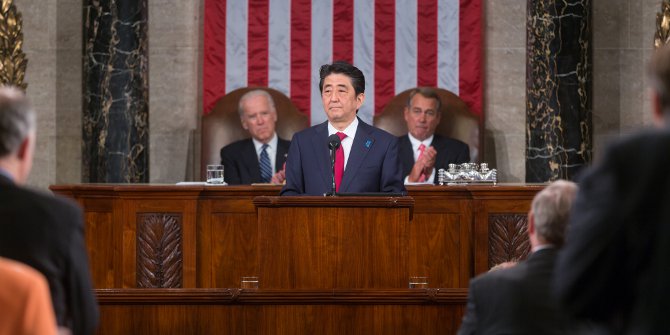USAPP Managing Editor, Chris Gilson looks at the best in political blogging from around the Beltway.
Jump to
[one_half last=”no”]
President Obama’s final state of the union
The 2016 election
The Democrats’ 2016 campaign
The Republican Party’s 2016 campaign
[/one_half][one_half last=”yes”]
The Republicans’ 6th debate
Government, the Beltway and Congress’ agenda
Foreign policy, defense and trade
Obamacare and health policy
The economy and society
[/one_half]
Obama, the Democratic Party, and the GOP
On Sunday, The Atlantic writes that President Obama’s announcement last week of the expansion of background checks on gun sales has exposed the rift between the Republican and Democratic Parties on gun control. They say that, as is the case with issues such as climate change and abortion, gun control knits together a Democratic coalition of people with similar values and alienates more culturally conservative groups of older, blue-collar rural whites. Tuesday saw President Obama give his final State of the Union address to Congress (of which more later). The Daily Signal uses the speech to reflect on what seven years of Obama’s presidency has done for Americans, concluding that by most indicators, Obama’s two terms have been an economic failure.
Turning to the Democratic Party, Red State reports on the results of a new poll which has found that only 29 percent of Americans now identify as Democrats – the lowest figure ever recorded. Prior to 1988, this figure had never gone below 37 percent.
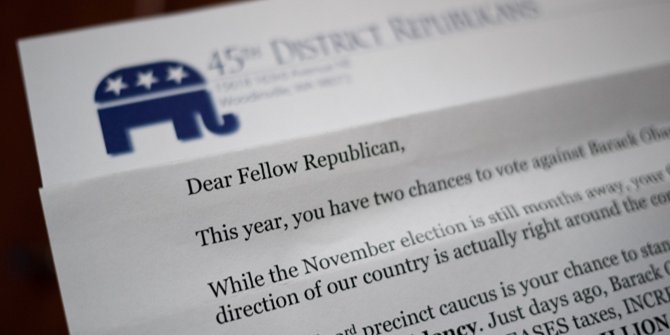
Moving across the aisle to the Republican Party, Townhall writes this week that the GOP have fallen into a ‘purity trap’, with conservatives on the party’s right criticizing House leadership for not opposing President Obama’s agenda hard enough. These critiques ignore the fact that the GOP establishment has passed measures which have ‘peeled back’ Obamacare and defunded Planned Parenthood, only for these measures to be repealed by President Obama’s veto pen. Meanwhile, No More Mister Nice blog argues that despite what many in the media are saying, there is not going to be a “lasting split” between the Republican Party’s elites and the rank-and-file after the 2016 election. On Monday, The Fix comments that the Speaker of the House, Paul Ryan (R-WI) is emerging as the party’s “Anti-Trump”, with recent his comments warning against unbridled and un-conservative populism, as well as turning the GOP’s primary race to forgotten issues such as poverty.
President Obama’s final state of the union
As could be expected, President Obama’s seventh and last State of the Union address garnered a great deal of commentary from across the political spectrum. In the lead up to the speech, discussion included:
- How the ‘Bully pulpit’ of the presidency is not what it used to be (The Atlantic).
- Obama left an empty seat at the State of the Union in honor and memory of the victims of gun violence (Crooks & Liars)
- Five national security problems we weren’t likely to hear about, including needing a larger army and navy (The Daily Signal)
- Why Obama’s last address is not likely to be much different to all of his others (Hit & Run).
After his address on Tuesday night, comments on the speech were varied:
- Some characterized is as a “strikingly different” State of the Union address, with its focus on rebutting GOP presidential candidates (The Atlantic)…
- … and critique of New York billionaire (and GOP primary candidate) Donald Trump – though not by name (Wonkblog).
- Others thought it an “odd” speech, as it was broadly indifferent to current legislative and partisan politics (TPM).
- As he began, Obama promised it would be a short address – it was the 16th longest since 1966 (The Fix).
- It showed that Obama is generally done with asking Congress to do things – except on criminal justice reform, addressing the heroin epidemic, funding universal pre-kindergarten and taking poverty seriously (The Fix).
-

Official White House Photo by Pete Souza If you feel that Obama’s speech needs some unravelling, the Mischiefs of Faction are here to help.
- Twenty-one states have never been mentioned by President Obama across his seven State of the Union addresses (Smart Politics).
- Some thought the State of the Union was a dud – like Obama’s presidency given that 2/3 of Americans think that the country is headed in the wrong direction (Hit & Run).
- Dud or not, Obama’s final State of the Union gained record low ratings, with only 31.3 million viewers (Outside the Beltway).
- South Carolina Governor Nikki Haley gave the GOP’s response to the state of the union, stating that the country has “big decisions to make” (The Daily Signal).
- The mainstream media loved Haley’s speech – which was reflective and critical of Donald Trump – but conservatives most certainly did not (The Fix).
The 2016 election
On Monday, Daily Kos looks at what they say are the hidden costs of gerrymandering, one of which is that previously competitive districts are now becoming uncompetitive. On Wednesday, Wonkblog has a map of what Congressional districts would look like in the absence of gerrymandering.
This week, The Fix examines what they say is the “growing myth” of the independent voter. While 42 percent of people claim to be Independent, a majority either lean (and vote for) Republican or Democratic.
Looking to 2016’s Congressional elections, Roll Call’s Heard on the Hill says that the presidential primary calendar could help Congressional challengers. Given that candidates like Texas Senator Ted Cruz and Donald Trump are hoping to lure anti-establishment voters to the polls, this could also affect outcomes for Congressional candidates.
With the New Hampshire primary now less than a month away, The Fix wonders who has the best ground game in the Granite State. They conclude that because of the haziness of field numbers, we may never know. Sabato’s Crystal Ball reckons that we are almost certain to be in for some surprises in both Iowa and New Hampshire next month given their usual role in rearranging the presidential field in past elections.
The Democrats’ 2016 campaign
On Saturday, Post Politics reports that even as former Secretary of State, Hillary Clinton, has been warning Iowa’s Democrats that she is the only candidate who can win the general election, Vermont Senator, Bernie Sanders has been urging them to look at polls which show him beating Donald Trump by a greater margin than Clinton. By Wednesday, the Democratic race had continued to tighten, with Clinton’s lead over Sanders narrowing to 7 points, down from 20 in December, says Outside the Beltway. That said, most Democrats still believe Clinton will be the nominee.
Looking at the Democrats’ campaign for Congress, PoliticusUSA says that the party is confident that they are within striking difference of winning back the Senate, as a Trump or Cruz nomination could put GOP Senate seats in blue and purple states in jeopardy. Roll Call’s Heard on the Hill meanwhile comments that the Democrats are targeting vulnerable Senate Republicans for being loyal to their party, rather than to the interest of their constituents.
Moving on to the Democratic Party’s presidential primary field:
Hillary Clinton
- Clinton and Bernie Sanders have very different ideas about taxes; she supports taxes on high earners while Sanders would raises taxes on the middle classes (The Atlantic).
- Clinton wants to tax the rich to the tune of a 4 percent surcharge for those earning more than $5 million a year (Wonkblog).
- Since she got Bill Clinton involved in the campaign, Donald Trump has been attacking him – Hillary has vowed to ignore the attacks (Red State).
-
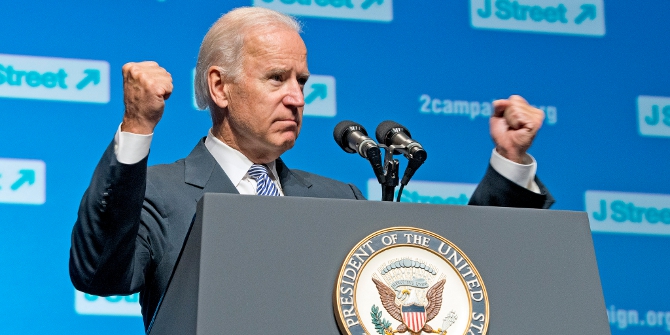
Vice President Joe Biden Credit: jstreetdotorg (Flickr, CC-BY-NC-SA-2.0) Vice President Joe Biden this week trolled Clinton “big time”, saying that she was “new” at talking about the wealth gap (The Fix).
- Criticizing Bernie Sanders this week over his support for single-payer healthcare, Clinton has evidently decided that “Medicare for all” is not a good idea (America blog)
- Clinton doesn’t seem to be nervous about the threat that Sanders poses. She should be (The Fix)
- The State Department’s latest dump of Clinton’s emails from the time when she was Secretary of State may lead some problems for her (Townhall).
- Clinton may have more than her emails to worry about – her national lead is slipping faster than it did when she last ran for President in 2008 (The Fix).
Bernie Sanders
- Despite his polling lead, the media’s blackout on the Vermont Senator is continuing (Informed Comment)
- Hillary Clinton this week called on Sanders to commit to repealing a gun manufacturer liability law which he voted for in 2005 (Post Politics).
- Sanders this week was neck and neck with Clinton in Iowa and New Hampshire according to the polls (PoliticusUSA).
- Despite doing well in the polls, Sanders still has yet to unveil some major policy proposals, including on tax and foreign policy (Post Politics).
- What if Sanders is the Democrats’ best bet at winning the White House? (The Atlantic).
- The liberal Nation magazine this week endorsed Bernie Sanders – an endorsement that’s really a rejection of Hillary Clinton (The Fix).
Martin O’Malley
- The campaign of former Maryland Governor, Martin O’Malley is flagging – he blames the Democratic National Committee for its ‘undemocratic’ debate schedule (Post Politics).
- Despite his protests about the debates, O’Malley will make the next one on Sunday – thanks to NBC’s rounding up of his 4.6 percent poll showing in Iowa (The Fix).
The Republican Party’s 2016 campaign
What a week for the GOP. The party’s presidential primary rolled on with another debate, and continued accusations that Texas Senator Ted Cruz may not be eligible for the presidency because of his Canadian birth. Caffeinated Politics says that billionaire Charles Koch has recently complained at his lack of influence in the GOP primary (and gets no sympathy). Outside the Beltway comments that economist Arthur Laffer’s prediction of a GOP landslide in the fall is laughable.
FiveThirtyEight argues on Monday that the only thing worse for the Republican Party than the nomination of Donald Trump would be a third party candidacy, something that could split the vote and hand the Democrats the White House.
America blog writes this week that in the lead up to the New Hampshire primary and the Iowa caucus, it’s becoming clear that none of the GOP’s candidates know how to run a field campaign – especially Donald Trump.
The Republicans’ 6th debate
Thursday night saw the latest GOP debate in South Carolina. Ahead of the debate, commentary included:
- The six big issues ahead of the debate – including terrorism, US-Iran relations, Ted Cruz’s birthplace, and the economic recovery (The Fix).
- Senator Rand Paul of Kentucky didn’t make the cut for Thursday’s main debate stage – so will boycott the undercard debate (Post Politics).
And from after the debate:
- The undercard debate summarized in one graph (The Fix).
- As mentioned, Ted Cruz and Donald Trump traded barbs over the former’s eligibility to run for president (Crooks & Liars).
- The Fix reckons that Florida Senator Marco Rubio was the biggest winner of the debate, and retired neurosurgeon Ben Carson was the biggest loser...
- …while others say that Trump was the winner (Powerline).
- The debate was actually only about three men – Donald Trump, Ted Cruz and Marco Rubio (TPM)…
- … or was it just about Cruz and Trump? (The Fix).
- The debate was a microcosm for the whole GOP primary so far (FiveThirtyEight)
- Despite all the discussion around the debates, they’re really not moving the polls all that much (The Fix).
Donald Trump
-
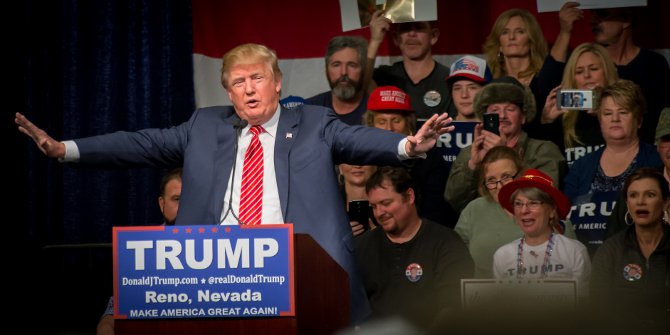
Donald Trump Credit: Darron Birgenheier (Flickr, CC-BY-SA-2.0) A new report suggests that as many as 20 percent of Trump’s supporters may actually be disaffected Democrats (Red State)
- Late last week a Muslim woman was kicked out of a Trump rally, just for protesting quietly (Post Politics)…
- …and this week he kicked protestors out of a rally in Vermont, after asking his security to take their coats despite the cold outside (The Atlantic).
- Most people think that Trump can’t win the GOP nomination – here’s one chart that might change their minds (The Fix)…
- … though Trump may yet have an electability paradox – supported by many in the primary, he may struggle to win over voters in the general election (The Atlantic).
- If Trump were to win the nomination, then that would be very good news for the GOP’s consultant class (Red State).
- How the GOP’s nomination rules might help Trump to win the nomination on the first ballot of the Republican convention in July (The American Prospect).
Trump’s getting much better as a candidate – he’s learning from how his audience reacts to his speeches (The Fix).
- Pondering Donald Trump (Red State)
- Trump’s here to stay, and he’s getting stronger (The Fix)
- It’s also likely that he’s been helped by the nearly $30 million in free advertising he’s gotten from Fox News so far (Crooks & Liars)
- Does his status as the first true social media candidate mean that Trump is the new JFK? (Townhall)
- Trump this week stated that his two divorces “don’t count”, since he wasn’t President when they happened (Crooks & Liars).
- No matter what, Iowa is Donald Trump’s most critical test – if his people don’t make it out to the polls, then that does not bode well for the states that follow (The Fix).
- The GOP establishment’s war on Donald Trump is intensifying (The Hill’s Congress blog).
Ben Carson
- The disarray in the retired neurosurgeon’s campaign continued this week with the resignation of Carson’s finance chairman amid questions over his use of campaign funds (Red State).
Jeb Bush
- The former Florida Governor, has no idea why his favorability has fallen – and he doesn’t really care (Daily Kos).
- Here’s a reality check – Jeb can’t fix it (American Thinker)
- The conventional wisdom that Jeb Bush is “next in line” for the nomination is dead (Townhall)
- Bush premiered a new ad this week- its premise? That Donald Trump is a jerk (Daily Kos).
Marco Rubio
-
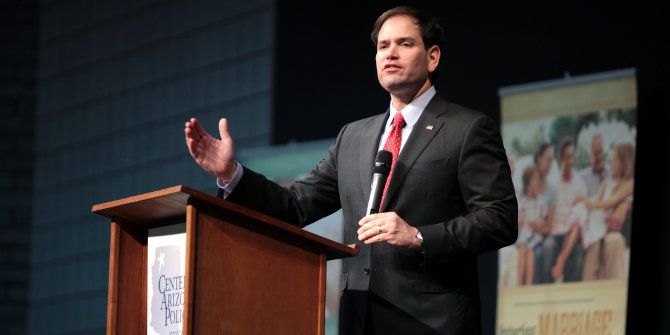
Florida Senator Marco Rubio Credit: Gage Skidmore (Flickr, CC-BY-SA-2.0) If the Florida Senator doesn’t win in Iowa, New Hampshire or South Carolina, can he still win the GOP presidential nomination? (Roll Call’s Rothenblog).
- Rubio stands by his 2004 proposal to grant in-state tuition to undocumented immigrants in Florida (Post Politics).
- Rubio has more recently proposed that the US government’s budget be balanced, something that would entail up to $19 trillion in spending cuts over the next decade (Perrspectives).
- In a last-minute reversal, Rubio decided to attend a classified Senate Intelligence Committee Briefing on North Korea rather than attending a fundraiser (Daily Kos).
- In 2007, Rubio endorsed former Iowa Governor, Mike Huckabee for the presidency. Is that something a true ‘Establishment’ candidate would do? (Political Animal)
Ted Cruz
- The controversy over Cruz’s Canadian birth continued into this week. If it doesn’t affect his eligibility for the presidency it will hurt his candidacy if more voters become aware of it (America blog).
- Apparently out of 54 GOP Senate colleagues, only four were willing to support Cruz on the ‘birther’ issue (Daily Kos).
- The Cruz birther row has spilled over into the Conservative media (The Fix)
- No matter what the Founders may have thought, current law says that he is indeed a natural-born citizen (The Atlantic).
- So far in this campaign, Cruz has refrained from attacking Donald Trump. That all changed this week with Cruz criticizing the billionaire for his “New York values” in response to Trump’s ‘birther’ claims (Post Politics)
- As of Tuesday, Cruz led in Iowa, at least according to a new poll (Red State)
- Has the birther controversy meant that Cruz has peaked in Iowa? (Outside the Beltway)
- Like it or not, Ted Cruz may be the ‘champion’ that the GOP needs (The Federalist)…
- … and the only establishment candidate who can beat Trump (The Fix).
- Despite his criticisms of “New York values”, it turns out that Cruz’s 2012 Senate campaign was financed by Wall Street (Crooks & Liars)
Chris Christie
- This week the New Jersey Governor went back to what helped make him famous – attacking teachers’ unions (Daily Kos).
Government, the Beltway and Congress’ agenda
On Monday this week, The Atlantic looks at the problems facing the government’s top managers in the Senior Executive Service (SES). They say that a new report shows that after 40 years the SES has still not perfected the “art of running the federal government”, mostly because of a lack of training and management skills. This week the Senate cast a procedural vote on Kentucky Senator Rand Paul’s bill to “Audit the Fed” by ending the ban pm the Government Accountability Office’s ability to the Fed’s monetary policy decisions. Monkey Cage gives a brief history of attempts to audit the Fed; it turns out that Paul is a relative latecomer.

This week the Supreme Court heard oral arguments in a case over the power of public sector employees’ unions to collect dues from those who don’t wish to be members. Outside the Beltway says that assessments of the arguments suggest that the Court may find against such requirements. Still on the Supreme Court, The Hill’s Congress blog argues on Tuesday that a decision against the California teacher’s union in the case just mentioned would strike another blow against the political power of ordinary Americans.
Moving to Congress, on Friday The Atlantic says that House Speaker Paul Ryan (R-WI) and Senate Majority Leader Mitch McConnell are attempting to “keep the peace” between one another. Ryan is keen for the House to pass a number of ambitious bills that shows that the GOP is laying the groundwork for a Republican presidential administration, while McConnell just wants to pass a few appropriations bill to try and hang on to the party’s Senate majority of four. The Daily Signal writes this week that McConnell and the GOP Senate leadership are proposing limiting the filibuster on appropriations bills. They say that while McConnell has stated that the move will bring order to what is a dysfunctional process, it will actually centralize power in the hands of a few and damage the Senate.
Foreign policy, defense and trade
On Sunday, Red State looks at whether or not emails from Hillary Clinton’s private email server which have been released by the State Department have exposed a scheme to sell US secrets in exchange for political influence.
The Daily Signal this week has ten steps which they say President Obama needs to take in order to fix the country’s foreign policy. These include rethinking how it deals with Russia, adopting a new counterterrorism strategy, and reforming border security.
When Barack Obama first ran for office in 2008, one of his main policy platforms was the closure of the US prison in Guantanamo Bay, Cuba. More than seven years after he took office, the prison remains open. Informed Comment argues Tuesday that the best way to close Gitmo would be to give it back to Cuba.
With foreign policy on the agenda in the ongoing GOP primary race, The Federalist discusses what we should have learned from the Iraq War. They comment that the aftermath of the war should be understood as a hard-won success which was undone by the election of President Obama.
Tuesday saw Iran seize two US Navy ships and ten US sailors, and return them after a day or so. Red State says that this sort of thing happens because the Obama administration is viewed as a ‘joke’ by its adversaries. Powerline also discusses the incident, writing that despite what Vice-President Joe Biden and Secretary of State John Kerry, there was an apology, it just came from one of the captured crew. They say that the incident has left the US ‘humiliated’.
Obamacare and health policy
On Saturday, Daily Kos says that a new study has found that Texas – which has fought the hardest against Obamacare – has seen huge benefits from the Affordable Care Act, with the number of people reporting problems paying their medical expenses having fallen by 15 percent.
Last week Congressional Republicans voted for the 62nd time to repeal Obamacare, a measure which was subsequently vetoed by President Obama. The American Prospect says that even if the GOP were to gain the White House this year, they will not repeal Obamacare. Why? Because it would be a catastrophe. Townhall also looks at the Obamacare repeal, arguing that the GOP’s recent efforts show that it is on life support, and that its repeal could become the winning campaign issue for Republicans in the election.
The economy and society
Saturday sees The Atlantic look at why mergers are in vogue in the business world – 2015 saw nearly $5 trillion worth of such deals announced. They say that the mega-deals show the growing confidence of the corporate sector and a continued desire among large firms to cut costs and tax liabilities.

Wonkblog says that while President Obama’s claims about the growth in manufacturing drops over the past six years is true, the strong dollar and sluggish global growth are now contributing to the levelling off of manufacturing employment growth. Paul Krugman is similarly equivocal, commenting that Obama’s economic performance compared to the past has not been great, but it has also not been too bad either.
Economic improvement or not, Daily Kos has the sobering news that more than one million Americans will have their food stamps taken away because they are unable to find work.
On Wednesday, Outside the Beltway reports that despite Obama’s claims about the country’s economic successes, 93 percent of US counties have still not fully recovered from the reception. This could also be linked to the fact that half of millennials reckon that the American Dream is dead, as reported by The Daily Signal.
Featured image credit: Rocky Chang (Flickr, CC-BY-NC-2.0)
Please read our comments policy before commenting.
Note: This article gives the views of the author, and not the position of USAPP– American Politics and Policy, nor of the London School of Economics.
Shortened URL for this post: http://bit.ly/1PyhuKy


